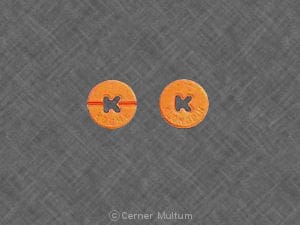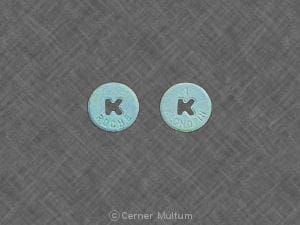Klonopin
Generic name: clonazepam
Drug classes: Benzodiazepine anticonvulsants, Benzodiazepines
Medically reviewed by A Ras MD.
What is Klonopin?
Klonopin is a prescription medicine used alone or with other medicines to treat certain types of seizure disorders (epilepsy) in adults and children, panic disorder with or without fear of open spaces (agoraphobia) in adults.
Klonopin is a federally controlled substance (C-IV) because it contains clonazepam that can be abused or lead to dependence. Keep Klonopin in a safe place to prevent misuse and abuse. Selling or giving away Klonopin may harm others, and is against the law. Tell your healthcare provider if you have ever abused or been dependent on alcohol, prescription medicines, or street drugs.
It is not known if Klonopin is safe or effective in treating panic disorder in children younger than 18 years old.
Description
Klonopin, a benzodiazepine, is available as scored tablets with a K-shaped perforation containing 0.5 mg of clonazepam and unscored tablets with a K-shaped perforation containing 1 mg or 2 mg of clonazepam. Each tablet also contains lactose, magnesium stearate, microcrystalline cellulose and corn starch, with the following colorants: 0.5 mg—FD&C Yellow No. 6 Lake; 1 mg—FD&C Blue No. 1 Lake and FD&C Blue No. 2 Lake.
Chemically, clonazepam is 5-(2-chlorophenyl)-1,3-dihydro-7-nitro-2H-1,4-benzodiazepin-2-one. It is a light yellow crystalline powder. It has a molecular weight of 315.72 and the following structural formula:

What is the most important information I should know about Klonopin?
- Klonopin is a benzodiazepine medicine. Taking benzodiazepines with opioid medicines, alcohol, or other central nervous system (CNS) depressants (including street drugs) can cause severe drowsiness, breathing problems (respiratory depression), coma, and death. Get emergency help right away if any of the following happens:
- shallow or slowed breathing
- breathing stops (which may lead to the heart stopping)
- excessive sleepiness (sedation)Do not drive or operate heavy machinery until you know how taking Klonopin and opioids affects you.
- Risk of abuse, misuse, and addiction. There is a risk of abuse, misuse, and addiction with benzodiazepines, including Klonopin, which can lead to overdose and serious side effects including coma and death.
- Serious side effects including coma and death have happened in people who have abused or misused benzodiazepines, including Klonopin. These serious side effects may also include delirium, paranoia, suicidal thoughts or actions, seizures, and difficulty breathing. Call your healthcare provider or go to the nearest hospital emergency room right away if you get any of these serious side effects.
- You can develop an addiction even if you take Klonopin as prescribed by your healthcare provider.
- Take Klonopin exactly as your healthcare provider prescribed.
- Do not share your Klonopin with other people.
- Keep Klonopin in a safe place and away from children.
- Physical dependence and withdrawal reactions. Klonopin can cause physical dependence and withdrawal reactions.
- Do not suddenly stop taking Klonopin. Stopping Klonopin suddenly can cause serious and life-threatening side effects, including, unusual movements, responses, or expressions, seizures, sudden and severe mental or nervous system changes, depression, seeing or hearing things that others do not see or hear, an extreme increase in activity or talking, losing touch with reality, and suicidal thoughts or actions. Call your healthcare provider or go to the nearest hospital emergency room right away if you get any of these symptoms.
- Some people who suddenly stop benzodiazepines have symptoms that can last for several weeks to more than 12 months, including, anxiety, trouble remembering, learning, or concentrating, depression, problems sleeping, feeling like insects are crawling under your skin, weakness, shaking, muscle twitching, burning or prickling feeling in your hands, arms, legs or feet, and ringing in your ears.
- Physical dependence is not the same as drug addiction. Your healthcare provider can tell you more about the differences between physical dependence and drug addiction.
- Do not take more Klonopin than prescribed or take Klonopin for longer than prescribed.
- Klonopin can make you sleepy or dizzy and can slow your thinking and motor skills. This may get better over time.
- Do not drive, operate heavy machinery, or do other dangerous activities until you know how Klonopin affects you.
- Klonopin may cause problems with your coordination, especially when you are walking or picking things up.
- Do not drink alcohol or take other drugs that may make you sleepy or dizzy while taking Klonopin until you talk to your healthcare provider. When taken with alcohol or drugs that cause sleepiness or dizziness, Klonopin may make your sleepiness or dizziness worse.
- Like other antiepileptic medicines, Klonopin may cause suicidal thoughts or actions in a very small number of people, about 1 in 500.
Call your healthcare provider right away if you have any of these symptoms, especially if they are new, worse, or worry you:- thoughts about suicide or dying
- new or worse anxiety
- trouble sleeping (insomnia)
- acting on dangerous impulses
- attempts to commit suicide
- feeling agitated or restless
- new or worse irritability
- an extreme increase in activity and talking (mania)
- new or worse depression
- panic attacks
- acting aggressive, being angry, or violent
- other unusual changes in behavior or mood
How can I watch for early symptoms of suicidal thoughts and actions?
- Pay attention to any changes, especially sudden changes, in mood, behaviors, thoughts, or feelings.
- Keep all follow-up visits with your healthcare provider as scheduled.
Call your healthcare provider between visits as needed, especially if you are worried about symptoms.
Suicidal thoughts or actions can be caused by things other than medicines. If you have suicidal thoughts or actions, your healthcare provider may check for other causes.
- Do not stop Klonopin without first talking to a healthcare provider.
- Stopping Klonopin suddenly can cause serious problems. Stopping Klonopin suddenly can cause seizures that will not stop (status epilepticus).
Who should not take Klonopin?
Do not take Klonopin if you:
- are allergic to benzodiazepines
- have significant liver disease
- have an eye disease called acute narrow angle glaucoma
Ask your healthcare provider if you are not sure if you have any of the problems listed above.
What should I tell my healthcare provider before taking Klonopin?
Before you take Klonopin, tell your healthcare provider if you:
- have liver or kidney problems
- have lung problems (respiratory disease)
- have or have had depression, mood problems, or suicidal thoughts or behavior
- have any other medical problems
- are pregnant or plan to become pregnant. It is not known if Klonopin can harm your unborn baby. Tell your healthcare provider right away if you become pregnant while taking Klonopin. You and your healthcare provider will decide if you should take Klonopin while you are pregnant.
- Studies in pregnant animals have shown harmful effects of benzodiazepine medications (including the active ingredient in Klonopin) on the developing fetus.
- Children born to mothers receiving benzodiazepine medications (including Klonopin) late in pregnancy may be at some risk of experiencing breathing problems, feeding problems, hypothermia, and withdrawal symptoms.
- If you become pregnant while taking Klonopin, talk to your healthcare provider about registering with the North American Antiepileptic Drug Pregnancy Registry. You can register by calling 1-888-233-2334. The purpose of this registry is to collect information about the safety of antiepileptic drugs during pregnancy.
- are breastfeeding or plan to breastfeed. Klonopin can pass into breast milk. You and your healthcare provider should decide how you will feed your baby while you take Klonopin.
Tell your healthcare provider about all the medicines you take,including prescription and over-the-counter medicines, vitamins, and herbal supplements.
Taking Klonopin with certain other medicines can cause side effects or affect how well Klonopin or the other medicines work. Do not start or stop other medicines without talking to your healthcare provider.
How should I take Klonopin?
- Take Klonopin exactly as your healthcare provider tells you. If you take Klonopin for seizures, your healthcare provider may change the dose until you are taking the right amount of medicine to control your symptoms.
- Klonopin is available as a tablet.
- Do not stop taking Klonopin without first talking to your healthcare provider. Stopping Klonopin suddenly can cause serious problems.
- Klonopin tablets should be taken with water and swallowed whole.
- If you take too much Klonopin, call your healthcare provider or local Poison Control Center right away.
What should I avoid while taking Klonopin?
- Klonopin can slow your thinking and motor skills. Do not drive, operate heavy machinery, or do other dangerous activities until you know how Klonopin affects you.
- Do not drink alcohol or take other medicines that may make you sleepy or dizzy while taking Klonopin until you talk to your healthcare provider. When taken with alcohol or medicines that cause sleepiness or dizziness, Klonopin may make your sleepiness or dizziness much worse.
What are the possible side effects of Klonopin?
See also “What is the most important information I should know about Klonopin?”.
Klonopin can make your seizures happen more often or make them worse. Call your healthcare provider right away if your seizures get worse while taking Klonopin.
The most common side effects of Klonopin include:
- drowsiness
- problems with walking and coordination
- dizziness
- depression
- nausea
- fatigue
- problems with memory
These are not all the possible side effects of Klonopin. Call your doctor for medical advice about side effects.
You may report side effects to FDA at 1-800-FDA-1088. You may also report side effects to Genentech at 1-888-835-2555.
Drug Interactions
A total of 486 medications are known to interact with Klonopin. Use the Interactions Checker Tool.
Common Interactions Checks
General information about the safe and effective use of Klonopin
Medicines are sometimes prescribed for purposes other than those listed in a Medication Guide. Do not use Klonopin for a condition for which it was not prescribed. Do not give Klonopin to other people, even if they have the same symptoms that you have. It may harm them.
You can ask your pharmacist or healthcare provider for information about Klonopin that is written for health professionals.
How should I store Klonopin?
- Store Klonopin between 59°F to 86°F (15°C to 30°C)
- Keep Klonopin and all medicines out of the reach of children.
What are the ingredients in Klonopin?
Active ingredient: clonazepam
Inactive ingredients:
- 0.5 mg tablets contain lactose, magnesium stearate, microcrystalline cellulose, corn starch, FD&C Yellow No. 6 Lake
- 1 mg tablets contain lactose, magnesium stearate, microcrystalline cellulose, corn starch, FD&C Blue No. 1 Lake and FD&C Blue No. 2 Lake
- 2 mg tablets contain lactose, magnesium stearate, microcrystalline cellulose, corn starch
Label
PRINCIPAL DISPLAY PANEL – 0.5 MG TABLET BOTTLE LABEL
- NDC 0004-0068-01
- Klonopin®
(clonazepam)
CIV - 0.5 mg
- Each tablet contains 0.5 mg clonazepam.
- ATTENTION PHARMACIST: Dispense the
accompanying Medication Guide to each patient.
For additional Medication Guides call
1-877-436-3683 or visit
www.gene.com/gene/products/information/klonopin. - 100 tablets
- Rx only
- Genentech
- 10198419


PRINCIPAL DISPLAY PANEL – 1 MG TABLET BOTTLE LABEL
- NDC 0004-0058-01
- Klonopin®
(clonazepam)
CIV - 1 mg
- Each tablet contains 1 mg clonazepam.
- ATTENTION PHARMACIST: Dispense the
accompanying Medication Guide to each patient.
For additional Medication Guides call
1-877-436-3683 or visit
www.gene.com/gene/products/information/klonopin. - 100 tablets
- Rx only
- Genentech
- 10198420


PRINCIPAL DISPLAY PANEL – 2 MG TABLET BOTTLE LABEL
- NDC 0004-0098-01
- Klonopin®
(clonazepam)
CIV - 2 mg
- Each tablet contains 2 mg clonazepam.
- ATTENTION PHARMACIST: Dispense the
accompanying Medication Guide to each patient.
For additional Medication Guides call
1-877-436-3683 or visit
www.gene.com/gene/products/information/klonopin. - 100 tablets
- Rx only
- Genentech
- 10198421


SRC: NLM .
